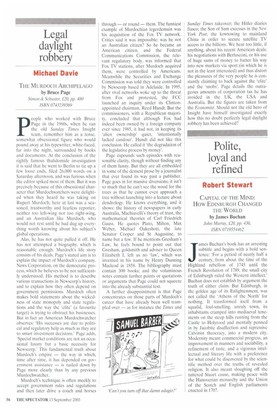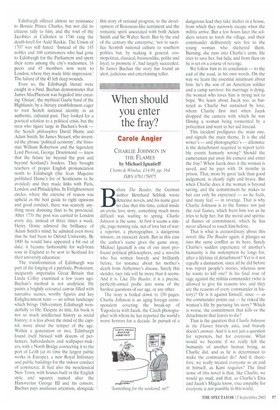Polite, loyal and refined
Robert Stewart
CAPITAL OF THE MIND: How EDINBURGH CHANGED THE WORLD by James Buchan John Murray, £20, pp. 436, ISBN 0719554462 jrames Buchan's book has an arresting subtitle and begins with a bold sentence: 'For a period of nearly half a century, from about the time of the Highland rebellion of 1745 until the French Revolution of 1789, the small city of Edinburgh ruled the Western intellect.' Buchan does not establish by argument the truth of either claim. But Edinburgh, in the golden age of its Enlightenment, was not called the 'Athens of the North' for nothing. It transformed itself from a squalid, foul-smelling, unruly town, its inhabitants cramped into mediaeval tenements on the steep hills running from the Castle to Holyrood and mentally penned in by Jacobite disaffection and repressive Calvinist theocracy, into a modern city. Modernity meant commercial progress, an improvement in manners and sociability, a refinement of taste, and a vigorous intellectual and literary life with a preference for what could be discovered by the scientific method over the truths of revealed religion. It also meant sloughing off the tattered Stuart cause, making peace with the Hanoverian monarchy and the Union of the Scotch and English parliaments enacted in 1707.
Edinburgh offered almost no resistance to Bonnie Prince Charles, but nor did its citizens rally to him, and the rout of the Jacobites at Culloden in 1746 rang the death-knell for Auld Reekie. The Union of 1707 was still hated: 'Instead of the 145 nobles and 160 commoners who had gone to Edinburgh for the Parliament and spent their rents among the city's tradesmen, 16 peers and 45 members now went to London, where they made little impression.' The failure of the 45 left deep wounds.
Even so, the Edinburgh literati were caught in a bind. Buchan demonstrates that James MacPherson was beguiled into creating `Ossian", the mythical Gaelic bard of the Highlands, by a literary establishment eager to root Scotch national identity in an authentic, cultured past. They looked for a poetical solution to a political crisis, but the men who figure large in Buchan's book — the Scotch philosophes David Hume and Adam Smith, Sir James Steuart, who invented the phrase 'political economy', the historian William Robertson and the legendary Lord Provost, George Drummond — knew that the future lay beyond the past and beyond Scotland's borders. They brought teachers of proper English pronunciation north to Edinburgh (the Scots Magazine published Hume's list of Scotticisms to be avoided) and they made links with Paris, London and Philadelphia. In Enlightenment circles, where the exercise of reason was upheld as the best guide to right opinions and good conduct, there was scarcely anything more damning than to be provincial. After 1736 the post was carried to London every day, instead of three times a week. Henry Home admired the brilliance of Adam Smith's mind: he admired even more that he had been to Oxford University. By 1800 he would have appeared a bit out of date: it became fashionable for well-born sons in England to be sent to Scotland for their university education.
The transformation of Edinburgh was part of the forging of a patriotic, Protestant, incipiently imperialist Great Britain that Linda Colley examined a few years ago. Buchan's method is not analytical. He paints a brightly coloured canvas filled with narrative scenes, worthy figures and key Enlightenment texts — an urban landscape which brings 18th-century Edinburgh wonderfully to life. Despite its title, his book is not so much intellectual history as social history; it is less about the mind of the capital, more about the temper of the age. Within a generation or two, Edinburgh found itself blessed with dozens of perfumers, haberdashers and wallpaper-makers, with a North Bridge connecting it to the port of Leith (at its time the largest public works in Europe), a new Royal Infirmary and public buildings for the indoor conduct of commerce. It had also the neoclassical New Town, with houses built in the English style and squares named after the Hanoverian George III and his consort. Buchan pays assiduous attention, alongside
this story of rational progress, to the development of Rousseau-like sentiment and the romantic spirit associated with both Adam Smith and Sir Walter Scott. But by the end of the century the enterprise, 'not to sacrifice Scottish national culture to southern politics but, by making it general, cosmopolitan, classical, businesslike, polite and loyal, to promote it', had largely succeeded. In James Buchan the story has found an alert, judicious and entertaining teller.



























































































 Previous page
Previous page